Yet these events are formally “separated” they are evidently interrelated. For a keynote of the discussions, talks and signed documents was the condition and prospects of relations between the US-led West and Russia, which during the passed 8 years yet didn’t return the status of superpower but became such subject of the international politics, which opinion cannot be already ignored.
It is well-known that the agenda of the Bucharest Summit primarily included further enlargement of the Alliance, US plans on deployment of the ABM systems, situation in Afghanistan endangering “block solidarity”, and regular meeting of the Russia-NATO Council attended by Russian President Vladimir Putin. The loudest “expected sensation” of the Bucharest Summit was a decision to delay membership of Ukraine and Georgia in the NATO Action Plan in spite of the official US opinion.
This decision initiated by Germany, France and several other European countries of the Alliance may be regarded as a certain success of the Russian diplomacy yet it hasn’t long-term prospects. The American party has made intensive backstage maneuvers and succeeded in including phrase “Ukraine and Georgia will be NATO members” into the text of the final communiqué. In so doing, NATO may return to this item already late next year. Besides, both Americans and Europeans understand well enough that today membership of Kiev and Tbilisi in the NATO Action Plan is politically inexpedient because both countries apparently fail to meet the membership criteria. The situation may change in future.
Meanwhile, the USA has succeeded in Bucharest in “pushing” more important and urgent decisions, in particular, it has got unanimous support of the NATO countries to its plans to deploy ABM systems in Poland and Czechia, and obligations of the European countries to increase their contribution to the war with Taliban combatants in Afghanistan. For example, France claimed on its decision to send a paratrooper battalion (700 men) to Southern Afghanistan. Besides, France also declared that it intends to return to a full-scale participation in the NATO military activities for the first time since President de Gaulle.
The most interesting event of the Summit was on its last day when outgoing Russian President Vladimir Putin made a number of important statements after the meeting of the Russia-NATO Council in Bucharest to determine positions of the Russian leadership on key problems of relations between Moscow and West. It is known that Vladimir Putin came to the Summit provided he has an opportunity to publicly air the stand of Russia.
At a press conference the Russian leader emphasized the importance of a dialogue between Russia and such large regional structures as NATO, and claimed that the parties succeeded in “radically advancing on the way of political dialogue and practical cooperation”. At the same time, according to him, the efficiency of cooperation between NATO and Russia depends on the fact to what extent the Alliance will respect the interests of Russia.
At the same time, Putin believes that currently there are “serious obstacles” to development of relations between Russia and North-Atlantic Alliance. According to him, the disagreements include NATO enlargement eastwards, recognition of Kosovo independence by many Western states, deployment of US ABM systems in Poland and Czechia. “All this does not contribute to strengthening of predictability and confidence in our cooperation, and does not encourage transition of our relations to a new quality level” the President emphasized. He also noted that Moscow is not satisfied with the oral statements only that the NATO activities are not directed against Russia, and referred to German Chancellor Bismarck saying that the most important factor is not intentions but potential.
V. Putin said that presence of a powerful military alliance at our borders will be perceived in Russia as a direct threat to our national security. “They say that Russia is incompliant. But why should we be compliant if the matter in question is the threat to our national security?” Putin said. He also denied a possibility of Russia applying for NATO membership, and indicated that in terms of security Russia is a self-sufficient country and is not going the share its sovereignty for the sake of illusive higher security. Putin also expressed an opinion that without Russia the Alliance is not capable of effectively solving problems and meeting challenges of the modern world.
The discussion on the condition and prospects of relationships between Russia and West was continued during the talks of Presidents Bush and Putin in Russian Black Sea resort Sochi. Prior to the Sochi meeting of the American and Russian leaders the Western press reported that Washington expects a breakthrough in the ABM discussion after Moscow sees that the American plans are unanimously supported by the NATO countries. But such expectations failed. “There are no changes in our principle stand with respect to the American plans. At the same time, there is a certain positive development. The American side at last heard our concern”, President Putin said after his meeting with Bush in the “Bocharov Rouchey” Sochi residence.
President Putin noted that Russia still supports an alternative to the US ABM shield in the form of a joint global ABM system with an equal democratic access to its control. Discussing a problem of NATO enlargement eastwards, which is so painful to Russia, Putin said in Sochi that in his opinion “in order to improve relations with Russia it is necessary not to invite former Soviet republics to military and political alliance by improve relations with Russia itself”. In this case the activities of the Alliance in one or another direction will not be perceived in a few years so painfully in our country as it happens today”.
The agenda of the outgoing Russian and American President meeting included problems of Iran, Kosovo, Afghanistan, CFE Treaty, war on terror, control of arms, economic cooperation and others, in which both countries are interested. In Sochi George Bush had a separate meeting with Russian President-elect Dmitry Medvedev who emphasized his desire to continue the work started by Bush and Putin in development of bilateral relations, which were called by the Russian President–elect “a key factor of international security”.
After the talks the Russian and American leaders signed a joint declaration titled “Declaration on Strategic Framework of Russian-American Relations”. This declaration primarily reflects a strategic choice in favor of development of constructive relations rather than the disagreements between the two countries. As quoted to Putin, the declaration “is directed forwards to the future, and in my opinion, it contains much more correct assessment of the achieved level of our partnership than it is usually done by stereotypes’. In turn, George Bush said that “the Cold War is over” and “there is no need to hang on the past”.
In general, the Bucharest NATO Summit and Sochi meeting of the Russian and American leaders demonstrated both remaining principal disagreements that will be hardly settled in the foreseeable future, and an actual potential for further dialogue. In any case, in the complicated conditions of the contemporary world Russia and West will have to cooperate to meet common global challenges. It is another question, to what extent the USA and NATO are ready to respect Russian concerns and interests, and restrain own geopolitical ambitions otherwise the constructive dialogue between the West and Russia hardly has good prospects.









